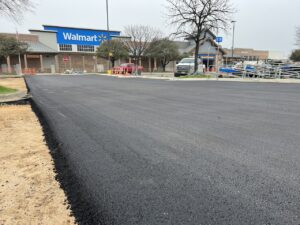 For decades, asphalt has been the most popular paving material in America. Compared to other paving materials, asphalt costs less, is faster to install, and has a unique look that most people find attractive. Asphalt pavements can also provide many years of service if they are properly maintained. However, just like all construction projects, the quality of the finished product depends on the contractor’s ability to do everything right. Of all the factors involved in an asphalt paving project, nothing has more importance than achieving proper compaction.
For decades, asphalt has been the most popular paving material in America. Compared to other paving materials, asphalt costs less, is faster to install, and has a unique look that most people find attractive. Asphalt pavements can also provide many years of service if they are properly maintained. However, just like all construction projects, the quality of the finished product depends on the contractor’s ability to do everything right. Of all the factors involved in an asphalt paving project, nothing has more importance than achieving proper compaction.
Table of Contents
ToggleWhat Do Paving Contractors Mean When They Discuss Compaction?
When Dallas paving contractors discuss compaction, they are usually referring to the compaction of the asphalt courses. However, asphalt is not always the only part of the pavement’s structure that requires compaction. It is not uncommon for a paving contractor in Dallas to find that the subgrade requires amending and compacting the soil. When contractors install commercial paving, they frequently construct an aggregate base on which to install the asphalt, and this base will also need to be compacted.
What Is the Purpose of Compaction When Installing Asphalt Paving?
In general, the purpose of compaction is to exert sufficient pressure on an object to remove the air voids and condense the object’s volume. To a Dallas paving company, asphalt compaction is all about removing air voids to force the particulates and asphalt binder to knit together. This makes the asphalt pavement denser, stronger, and less susceptible to fatigue damage as well as moisture damage.
What Happens When an Asphalt Paving Company Fails to Achieve Proper Compaction?
Your pavement will have a shorter life, and it will require frequent repairs to fix potholes, cracks, and other damage. Your pavement may show signs of distress, including rutting and raveling. It will be more likely to suffer from alligator cracking, which is sometimes called fatigue cracking. Surface depressions may form, typically in localized areas. In short, your pavement will not be able to support the weight of traffic, so it will quickly begin to fall apart.
What Might Prevent a Dallas Paving Contractor From Achieving Proper Asphalt Compaction?
When installing asphalt paving in Dallas, more than 99% of the time, poor compaction is due to an error on the part of the contractor’s crew members. The contractor is responsible for virtually all of the remaining instances.
1. Asphalt paving must be compacted while it has sufficient heat to be flexible. If the asphalt cools excessively, it will become too stiff to compact. The air voids remain, and the particles do not knit together properly.
2. The choice of roller can also impact compaction. For example, if the roller becomes too hot, it can cause bulging. In other cases, asphalt sticks to the drum, resulting in divots. It is also important to select the right rolling machine for the task at hand.
3. Rolling machine operators need to follow the pattern that the contractor designed. Deviating from the pattern could result in skipping the compaction along a strip or spot of paving.
When you need superior commercial paving services in the DFW metroplex, contact the professionals at HI-TEK Paving Services. We offer asphalt paving, concrete installation, asphalt overlays, parking lot striping, asphalt repair, concrete repair, asphalt crack repair, customized parking lot maintenance programs, and asphalt sealcoating. We have an exemplary reputation that we earned through honesty, hard work, integrity, craftsmanship, and customer service. If you would like to request a free quote on your next project, give us a call at 214-908-9641, email Kevin@HI-TEKPaving.com, or complete our online form.
